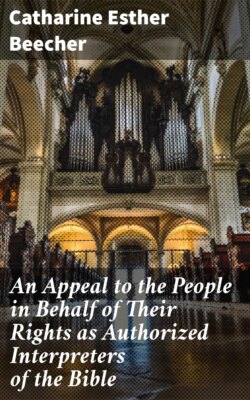Читать книгу An Appeal to the People in Behalf of Their Rights as Authorized Interpreters of the Bible - Catharine Esther Beecher - Страница 46
На сайте Литреса книга снята с продажи.
Chapter IX. The Principles of Common Sense Defined.
ОглавлениеTable of Contents
The preceding extracts exhibit a portion of the evidence to prove that the Augustinian system is contrary [pg 042] to the moral sense of mankind, and that theologians have failed, by their own concessions, to render it consistent and satisfactory even to themselves.
The next attempt will be to show that the people are endowed with principles of common sense, by the aid of which they can educe from the works of the Creator, independently of any revealed Word, a system of religion far superior to the one based on the Augustinian theory.
Our first aim will be to designate what is intended by “the principles of common sense.”
It is claimed, then, that there are certain truths, the belief of which exists in every rational human mind. This belief, in some cases, as all must allow, results from the constitution of mind given by the Creator, and not from any instruction or knowledge gained by other modes. Of this class is the belief of every mind in its own existence, and also the belief in the existence of other things beside ourselves.
There are other truths universally believed by every rational mind, where there may be room for question as to whether this belief is acquired or the result of constitutional organization. But this question is waived, as of little practical consequence for the present purpose of this work.
The fact on which the name and classification of these truths rests is, that the belief in them is common to all rational minds, and is regarded as so indispensable to true rationality, that whenever any person shows by words and actions that a belief in any one of these truths does not exist, he is regarded as deranged, that is to say, his reason is said to be more or less destroyed.
[pg 043]
This, therefore, is the test by which we are to distinguish these principles of common sense from all other knowledge. They are truths which are believed by all rational persons, so that the disbelief of any one of them, evinced in words and actions, is universally regarded as proof of a deranged mind. In such cases, a man, in common parlance, would be said to have “lost his mind,” or to have “lost his reason;” inasmuch as he is lacking in some of those peculiar features which constitute man a rational being.
In this work the question is also waived as to the number of truths which are to be included in this class. In regard to certain of them there can be no dispute. Of those involving any discussion, there probably will be no occasion to speak in this work. The writer does not claim that the common people, or that metaphysicians, when they speak of “common sense,” always refer to what is here designated by this term.
All that the writer claims is that there are certain truths, the belief of which is common to all minds, either as the result of constitutional organization or of acquired knowledge; and that these can be classified by this test, viz., that men universally talk and act as if they believed them, and when they cease to do so, are regarded as more or less insane.
Moreover, it is claimed that it is proper to call them principles of common sense, because they are that kind of sense which is common to the whole race, and also they are often referred to, both by metaphysicians and by the common people, by this term.
In the following chapters it will be shown that by the application of these principles, a system of natural religion can be gained from the works of the Creator [pg 044] by the same methods that men employ in all the ordinary concerns of life, and that thus we are as fully qualified to gain religious knowledge and peace as we are to secure temporal comfort and prosperity.
